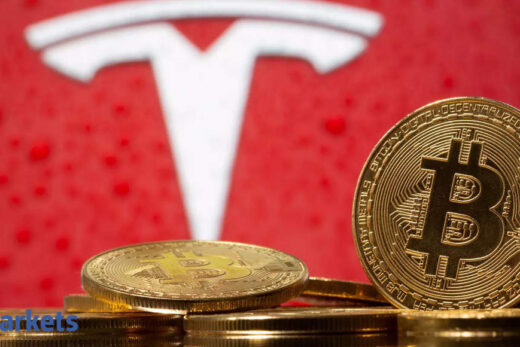After all, at their core, the measures announced by the Group of Seven nations represent a plan to reduce the profits of major multinational companies. For a company like NVidia Corp., which paid an effective tax rate of 2.63 per cent over the most recent 12-month period, news that the world’s largest economies are planning to implement a tax floor of 15 per cent ought to represent a substantial hit to future earnings.
There’s no sign that’s happening yet. If anything, the renewed likelihood of a global tax agreement since the Organization for Economic Cooperation and Development came out with detailed plans for such a deal last October and President Joe Biden was elected the following month has only increased the valuation premium for companies that, on paper, will lose out.
 Bloomberg
BloombergCompare the S&P 500 Index to the Nasdaq Composite, for instance. The latter is weighted toward the multinational technology companies that have been the target of the measures against tax base erosion — but its valuation premium to the more domestic-focused S&P 500 has rarely been richer than over the past 12 months, with a forward price-earnings multiple 9.6 points higher than the broader benchmark compared with a 3.9 point gap over the previous decade.
It’s the same picture in the U.K., where the FTSE Multinationals Index has run about 5.8 points ahead of the FTSE All-Share Ex-Multinationals, well above the 1.8 point advantage over the 10 preceding years.
 Bloomberg
BloombergCracking down on the hundreds of billions of dollars in government revenues avoided by aggressive tax planning shouldn’t be a painless process, especially when the benefits of the current setup are so heavily skewed toward some of the biggest companies in the world. That makes it a little surprising that the likes of Facebook Inc.’s vice-president of global affairs, Nick Clegg, was so quick to welcome the latest agreement.
Facebook has long called for reform of the global tax rules and we welcome the important progress made at the G7. T… https://t.co/veQSCZpdHV
— Nick Clegg (@nickclegg) 1622900254000
One explanation is that businesses like Facebook are already banking a significant win. U.S. corporate income taxes for large enterprises hovered around 35 per cent since the 1980s before dropping to 21 per cent with the 2018 Tax Cuts and Jobs Act. A rise back to pre-Trump levels was never on the cards, but even Biden’s initial proposal of a 28 per cent rate may now be junked. He’s prepared to leave the headline rate at 21 per cent in return for infrastructure spending and a commitment on the 15 per cent global minimum, the Washington Post reported last week, citing a person familiar with talks on the matter. With the U.S. accounting for an outsize share of global corporate profits, those sorts of concessions are the real prize in this process.
That’s not to say that nothing has been achieved in the past decade of efforts to tackle profit-shifting and tax avoidance. The light that’s been shone on multinationals’ tax payments through initiatives like the OECD’s program on tax transparency means that governments at last have a handle on the scale of the problem. The most important part of its current proposal, which would allow governments to charge top-up tax rates on companies that route profits through lower-tax jurisdictions, doesn’t need a complicated international accord to be implemented.
The problem is that even these steps have been compromised in the efforts to come up with an agreement that will win global assent. Just the initial reports on the OECD’s two main proposals comprise nearly 500 pages, and their illustration showing how to calculate companies’ tax liabilities is like an explosion in a flow chart factory:
Turning that into national legislation and integrating it with a global web of tax treaties while coaxing reluctant nations to join the accord will involve many thousands more pages and exemptions. To some extent, that’s an inevitable result of producing rules for a complicated world. Still, for tax lawyers and accountants, each fresh layer of complexity is an opportunity to find loopholes through which their clients’ tax payments can be minimized.
In all this, we’ve yet to see anything that suggests the gravitational pull of ever-lower corporate taxes is about to be reversed. A halt around levels not far above the minimum of 15 per cent seems where the world will end up a decade from now. That will be a win for incumbent multinational companies and their shareholders, who will continue to enjoy advantages through the international tax system that smaller upstarts won’t have access to. For everyone else — including the individual taxpayers forced to shoulder a larger burden of balancing their governments’ budgets — it will represent a loss.
A successful deal on multinationals’ tax minimization would represent a major blow for the world’s biggest companies. In the wake of this weekend’s agreement, their silence speaks volumes.



